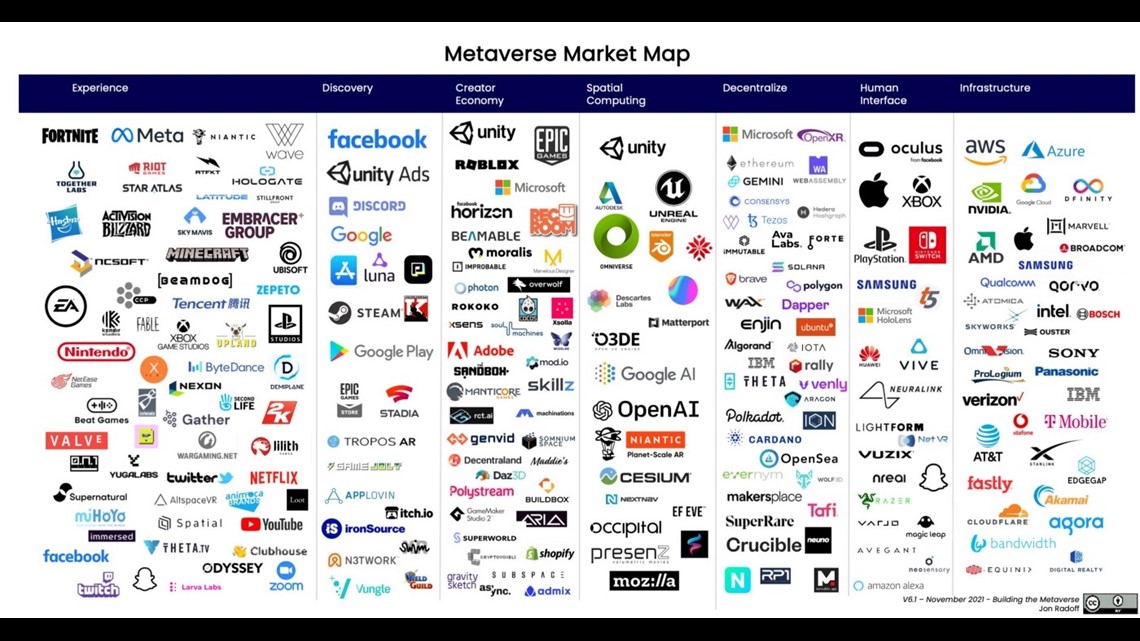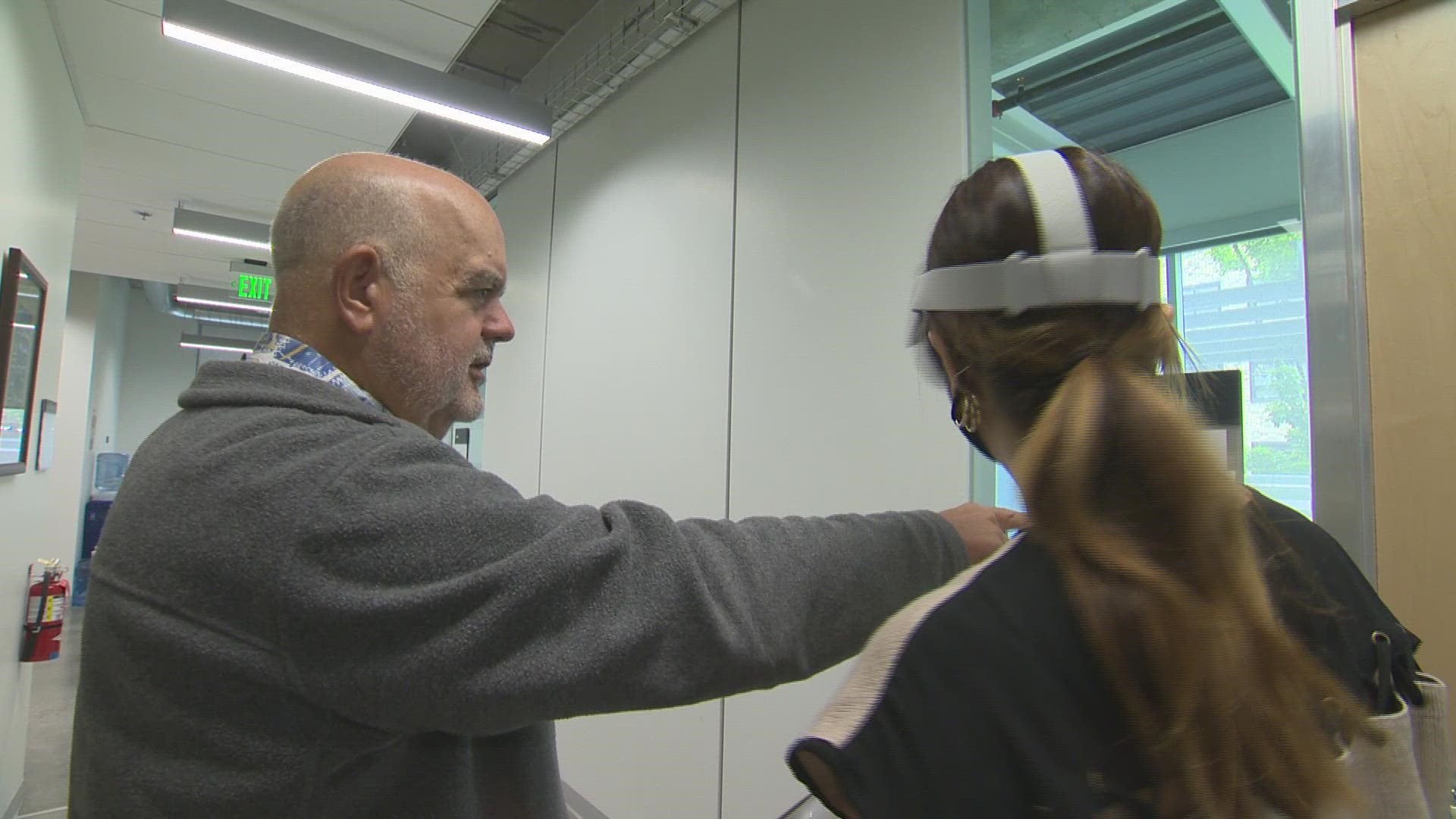PORTLAND, Ore. — The metaverse is the future. But really, it's already here. It's a whole digital world, accessible right now by clunky, big goggles that will only get smaller and better. It’s a 4d version of the internet that you're inside of, rather than just looking at. Boatloads of money are set to be made inside of it, so companies need to get on board or risk being left behind.
The exhilaration of virtual reality is hard to convey to those who've never tried it. There’s an experience called "Richie's Plank" available on PlayStation's VR and Meta's Oculus headsets. You’re standing in a digital city's downtown core. Look all around you and you see high-rise buildings, cars driving by, birds flying. Turn around and there’s an open elevator.
RELATED: What is the metaverse?
You step inside and see four buttons, the top floor being called The Plank. Reach to push the button and you feel the haptic technology in the controllers, almost like a real button push, and hear the sound. Then the elevator doors shut and you see the light whooshing upwards through the crack in the elevator doors. When it opens, you’re suddenly dozens of floors in the air and there’s a wooden plank. As soon as you step onto it, you hear the creaking of the board in your headset.
The feeling, the sounds, the 360 degree-ness, it feels so real. Scientists have studied people doing it.
"And it looks very real. It gives you the same kind of emotion as if you were really there doing that," said Skye Lininger, an executive in residence at Portland State University. "Your palms will sweat. Your blood pressure will go up a little bit. And so you can create a sense of presence and a sense of emotion within these digital environments."
Lininger is teaching the university's first course on the subject, "Introduction To The Metaverse." And this month, PSU became among the first schools to hold their entire class inside the metaverse. Each student, at home, created an avatar that resembled them. They wore an Oculus headset and held controllers, and sitting or standing inside the virtual class, they listened to virtual reality experts discuss examples of ways to use this new digital world.
Stanford was the first school in the world to do this last summer. Stanford medical students are now learning in virtual reality, students literally walking inside a body to label organs, learn the circulatory system, etc.
But where the metaverse will really make an impact is for commerce. Want to buy cool digital clothes for your avatar? Facebook and Walmart want to sell them to you. Nike is ready to sell digital shoes or shoes you could buy to arrive at your real front door. Want to go to a virtual Snoop Dog concert? He and others are already doing it.
The Brooklyn Nets are the first pro sports team to soon sell virtual tickets to see their real games. One hundred high-resolution cameras have been installed around Barclays Center to create that 360-degree experience. Fans will choose to be behind the basket, courtside or in the middle of the court for the game, all for a price but not as much as a regular ticket that close to the action would cost.
The Masters golf tournament is considering doing the same next year. Digital real estate is a thing: people using cryptocurrency to purchase plots of "land" to set up their own money-making ventures.
"What we are trying to teach the students here, to make them aware of is, that you don't need to be just thinking about what's coming next. You need to think about what's coming after what's coming next," Lininger said.
It's estimated half the companies on the S&P 500 right now will be knocked off and replaced within the decade as new tech surges faster and faster along.


These are the hundreds of companies that get it. They're creating the metaverse right now. From the UX (user experience), through the graphics, animation and monetization of things, to the hardware of headsets, microphones and controllers, down to the semiconductors, cloud computing and telecom needed to run it without glitches and store all the data.
Tony Schwartz is a criminal defense attorney of 20 years in Portland and now a part-time student at PSU.
"It was intriguing to me to be able to study, really, the future of technology as it's coming up," Schwartz said. "Kind of the way I looked at it was, if I had the chance to study the internet, the World Wide Web in 1998, 1999, before Facebook, you know, as Google wasn't even a public company and Amazon was four or five years old, would I have done it? Absolutely!"
Schwartz first enrolled in PSU's Business Blockchain certificate program, and now is taking the metaverse course. He's intrigued by the virtual learning aspect.
"I realized that the business use cases for this were unlimited," Schwartz said. "I immediately thought about all the ways that I could use this technology to assist my practice, like teaching law students how to give an opening statement or closing statement, teaching students how to take or defend depositions. And also give them a sense of what it's like to have an opposing counsel who's angry, combative, or a judge who's not giving you what you want, how to move around that.”
The possibilities are endless. Lininger is trying to get his students to see they better jump on the train.
"When you have early technology, you have lots of people trying to stake a claim," Lininger said. "The speed of development is happening so quickly that many companies don't see what's coming until it's overtaken them."
In KGW's ongoing series What's Next?, we look at the technology and work of the future.

